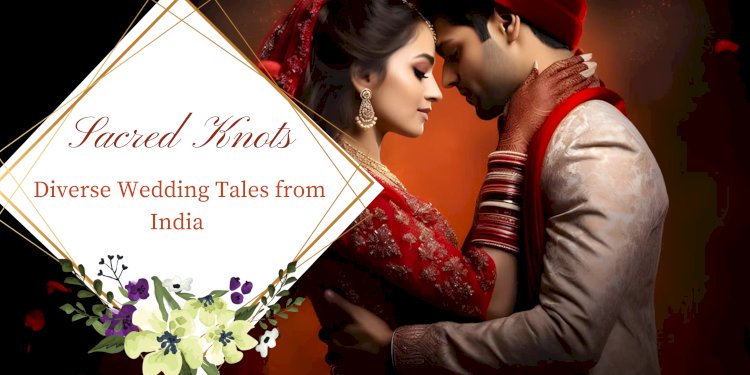Sacred Knots: Diverse Wedding Tales from India
In the enchanting realm of India's diverse cultural landscape, weddings unfold as breathtaking spectacles, embodying a rich tapestry of traditions. From the elaborate Hindu ceremonies adorned with vibrant colours and sacred rituals to the simplicity and elegance of Muslim nuptials, the Sikh Anand Karaj celebrates community and equality, Christian unions blending global and local customs, and Parsi Zoroastrian weddings steeped in ancient rituals—each celebration paints a unique portrait of cultural identity. The symphony of colours, the rhythmic beats, and the aromatic spices converge in a kaleidoscopic fusion, echoing the enduring beauty of unity in diversity that defines India's sacred bonds of matrimony.
By Shreya Rajvanshi Gangal

In the vibrant tapestry of Indian culture, weddings stand out as grand spectacles, reflecting the rich diversity and traditions that define this ancient land. From the snow-capped peaks of the Himalayas to the sun-kissed beaches of Goa, India's weddings are as diverse as its geography. In this article, we embark on a journey to unravel the intricate tapestry of wedding celebrations that grace this subcontinent, exploring the myriad customs, rituals, and festivities that make each union a unique and unforgettable event.
1. Hindu Weddings:
Hindu weddings are marked by elaborate rituals, colourful attire, and a profound connection to spirituality. The ceremony often takes place in a sacred space such as a temple, with rituals like the 'mehendi' (henna application) and 'saptapadi' (seven vows) holding deep cultural significance. The bride's red saree and the groom's sherwani add to the visual splendour of the occasion.
2. Muslim Nuptials:
Muslim weddings in India are characterized by simplicity and elegance. The 'nikah' ceremony, where the couple solemnizes their marriage contract, is the focal point. Intricate Islamic art, combined with traditional attire like the 'sherwani' for men and 'lehenga' for women, creates an atmosphere of timeless beauty.
3. Sikh Anand Karaj:
Sikh weddings are a celebration of community and equality. The Anand Karaj ceremony takes place in a Gurudwara, where the couple circumambulates the Guru Granth Sahib, symbolizing their spiritual journey together. The vibrant colours of the Sikh attire, 'phulkari' embroidery, and the rhythmic beat of the 'dhol' contribute to the festive atmosphere.
4. Christian Ceremonies:
Christian weddings in India blend traditional Christian rituals with local customs. The exchange of vows, the symbolic lighting of the unity candle, and the grandeur of the bride's white gown create a picturesque setting. Churches, adorned with flowers and lit candles, provide a serene backdrop for these celebrations.
5. Parsi Zoroastrian Weddings:
Parsi weddings are steeped in ancient Zoroastrian traditions. The 'Achumichu' ritual, where the couple exchanges a mixture of milk and sugar, symbolizes the sweetness of married life. The intricate 'parsi gara' sarees and traditional 'dagli' attire add a touch of timeless elegance.
Conclusion:
As we traverse the diverse landscapes of India, we find that weddings serve as cultural touchpoints that bind communities and families. Each ceremony, with its unique customs and rituals, contributes to the rich mosaic of traditions that define the subcontinent. The kaleidoscope of colours, the rhythm of traditional music, and the scent of aromatic spices all come together to create a symphony of celebration that transcends regional boundaries. In the unity of diversity, India's weddings stand as a testament to the enduring beauty of cultural richness and the timeless significance of the sacred bond of marriage.
What's Your Reaction?



















